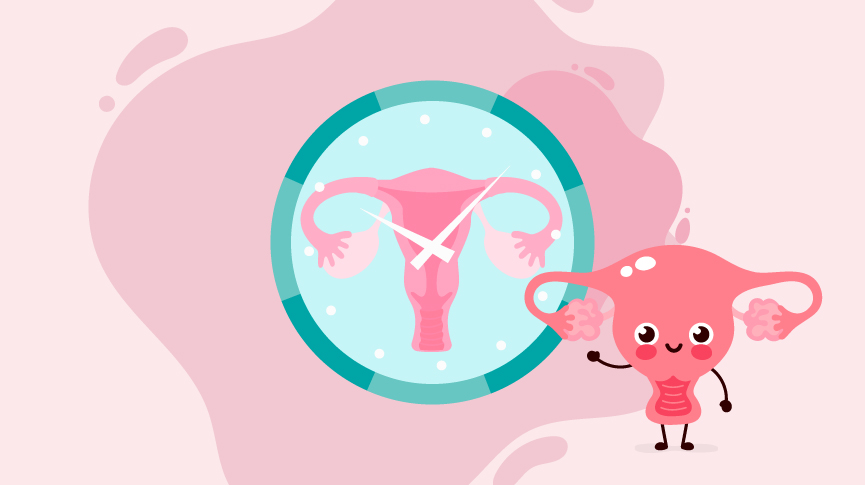Understanding The Length of Your Cycle

This article was medically fact-checked by Consultant Obstetrician and Gynaecologist Dr. Shree Datta.
Let’s talk about one of our favorite subjects- periods.
Every menstruating person has a different relationship with their monthly cycle.
For some, it can bring anxiety, fear, pain, shame, or embarrassment. For others, it may mean a sense of peace, relief, or gratitude. While there are countless factors that shape a person’s relationship with their monthly moon, one way to help heal it is by understanding your personal cycle.
What is Your Normal?
The magic number we typically hear floating around is twenty-eight days, with a “healthy” range being anywhere from twenty-one to thirty-five days. While it’s nice to have a guideline, when someone’s cycle deviates from this standard, it can cause worry or uncertainty.
One of the first things to remember when decoding the length of your cycle, is “What is normal for you?”.
To understand your period is to understand your body. Many health care providers consider the period a vital sign, and realize its ability to indicate other possible health problems like fibroids or pelvic inflammatory disease. If you know when to expect it, you will also know if something might be out of balance.
Falling in sync with your cycle means not only knowing when you’re going to bleed but also when to expect ovulation. Having this knowledge allows you to plan accordingly if you’re wanting to conceive – or not.
When beginning to track your cycle, remember that day one starts with the first day of your period. Figuring out your “normal”, means understanding not to track with the days of the month. Your cycle may very well be longer or shorter than these days, which means if you get your period on the fourth of one month, you probably can’t expect it to come on the fourth of the next month. Also, there aren’t the same amount of days in every month.
Some people find it helpful to track their period in relation to the lunar cycle. For people whose cycle is longer or shorter than the moon’s, this isn’t going to line up.
If this is you, don’t be discouraged! You know your body best, which means only you can know what is your normal.
Out of Whack?
The human body is a sensitive piece of equipment, and there’s a lot of factors that could throw it off. If you feel like your period is out of balance or irregular, there are some things to look out for.
Puberty
Ah yes, when a girl becomes a woman. These years of reproductive development can range anywhere from age seven to someone’s early twenties.
Even after someone gets their first period, they’ll continue to develop and change as their hormone levels regulate. This means it could take a few years of periods before your body has a “normal” cycle length.
Menopause
On the other side of the spectrum, your cycle changes as you begin to approach menopause. In the time before menopause, aka perimenopause (https://www.intimina.com/blog/peri-what-perimenopause/), your periods may become further and further apart, as your body nears the end of your reproductive years.
If you have a hunch that menopause is causing your cycles to become longer, you can get a hormone panel from your doctor.
As people approach menopause, they might notice other changes in their cycle besides decreasing regularity. Their periods may also change in nature, length and heaviness, while other symptoms like hot flashes and night sweats start to appear.
Pregnancy
Somewhere in between puberty and menopause, you may become pregnant! About one-third of pregnant people will experience “implantation bleeding”. Bleeding that occurs six to twelve days after conception, when a fertilized egg attaches itself to the uterine wall.
Some light spotting is normal throughout pregnancy, while heavier bleeding may indicate an ectopic pregnancy or miscarriage. If you didn’t know you were pregnant, you may mistake these for an irregular period.
For those who already know they are pregnant, and notice some bleeding, it’s advised to get this checked by your provider ASAP, to rule out any complications, or provide medical attention where necessary.
Birth Control
If you’re not looking to become pregnant, you may be on some form of hormonal birth control (HBC).
While they all work slightly differently, most forms of HBC work by stopping ovulation, while making it difficult for sperm to get to the egg.
Some people choose not to have a period through the use of their HBC, while others may experience lighter or irregular ones. Either way, because of the suppression of natural hormones, an irregular period while on HBC is hard to pinpoint.
Stress
This is a big one that’s often overlooked, especially when people have difficulty conceiving. Your stress levels play a huge part in your hormone regulation.
A stressed-out body does not make for the most fertile environment for a potential baby, which means you may be experiencing abnormal cycles. It’s not just emotional stress that could be influencing your period, physical stress from poor diet, environmental toxins, and certain medications can all tweak your cycle.
Reproductive Health Disorders
One of the first indicators of a reproductive health disorder is an abnormal period. Endometriosis, Polycystic Ovarian Syndrome, gynecological cancer, and more can all cause your cycle to be out of balance.
If you have a hunch that one of these disorders may be affecting your cycle, please seek professional medical advice. Help is there for you.
Get on Track
Are you ready to decode your cycle and deepen your understanding of your body? Well, it’s time to get tracking.
To start your period tracking journey, you can download one of the many convenient period tracking apps. Or you can do it the old fashioned way by keeping a “cycle journal”.
Keeping a cycle journal not only allows you to track the length of each part of your cycle, but also symptoms that go with it. You’ll start to see patterns like when you might be in hermit mode, when you’re feeling your most outgoing or creative, and how your cycle syncs up with your sex life.
Remember that it can take time to decode your cycle, especially if you’re working with any hormonal imbalances or reproductive health disorders. We encourage you to monitor your periods over three to four cycles, to notice if there are any significant changes. Have patience with your body, and yourself as you embark on this new phase of understanding.
Facts checked by:
Dr. Shree Datta
Dr. Shree Datta is a Consultant Obstetrician and Gynaecologist in London, specialising in women’s health including all menstrual problems such as fibroids and endometriosis. Dr. Shree is a keen advocate for patient choice, having written numerous articles and books to promote patient and clinician information. Her vision resonates with INTIMINA, with the common goals of demystifying periods and delivering the best possible care to her patients
Written by:

Natasha (she/her) is a full-spectrum doula and health+wellness copywriter. Her work focuses on deconstructing the shame, stigma, and barriers people carry around birth, sex, health, and beyond, to help people navigate through their lives with more education and empowerment. You can connect with Natasha on IG @natasha.s.weiss.



